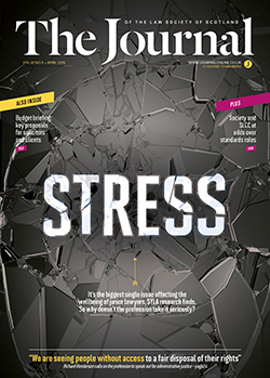The literal truth

It seems we’re failing. Literally.
I was the first of my family to go to university, and took my law degree at the University of Strathclyde. Today, it is one of Scotland’s top law schools, but it was not then. I walked through its slightly shabby portals (latterly the HQ of Strathclyde Police) in 1970, when the law school had existed for barely five years. It was regarded by many in the ancient universities as arriviste and inferior. Later, in a shiny new building, it had a room called the Law Workshop, which provoked a visiting sheriff to peer in and ask querulously, “What do you make in there – wigs?”
I remember debating in the hallowed Glasgow University Union, and being greeted thus by one of my opponents: “May I warmly welcome our guests from the University of Strathclyde, an institution not so much redbrick as papier-mâché. As one perambulates through its concrete cloisters, one is charmed by the sound of pupil calling unto pupil, ‘Jeezo, the bell has went’.”
When I began looking for an apprenticeship, as it was known then, it swiftly became clear that this snooty view was not confined to academia. Many firms considered Strathclyde so far below the salt as scarcely to be in the same room. Today, things are very different, and not just for Strathclyde. Graduates of Scottish law schools ancient and new are finding jobs in every kind of firm. Though we are still quite a conservative profession, and not entirely free of prejudice, most firms take care to design their recruitment processes to achieve equal opportunity. We seem largely to have discarded the rich variety of prejudices which so disfigured the landscape decades ago.
Language downgraded
But as these clouds scud away, another darkens the horizon: the alarming number of graduates now emerging with good degrees, but unable to spell, punctuate, and use grammar in the way what it is intended; the kind of clever, hardworking young people described to me recently by an exasperated managing partner as thinking that syntax is something levied on the price of drugs. For them, “The bell has went” is not a punchline, but normal speech.
I do not romanticise traditional education. A good deal of it mirrored Hobbes’s view of mankind’s natural condition: poor, nasty, brutish and short. But I will be grateful forever to the teachers who dinned into me a vocabulary and knowledge of the rules which have made an incalculable difference to my life. And I mourn the passing of a culture in which it was unquestioned by teachers and students alike that having these skills is non-negotiable.
In every walk of life, facility with language is fundamental, none more so than the practice of law. But do students agree? Recently, I came across an FT report from a leading university, where a law professor was very concerned about his students’ poor writing. “Each week in his class, they were asked to compose a one-page memorandum, which he would read and mark. The memos would answer a simple question from their textbooks. As the professor said, he wanted the assignment to be more about conveying their analyses than testing their ability to get the analyses right.”
Surely the students were grateful to this dedicated man for going the extra mile on their behalf? Not at all; in a vivid proof that no good deed goes unpunished, the students complained so loudly to the dean that the professor was urged to stop. The students said that in today’s world, knowing how to write was unnecessary. “Emails and tweets are the medium of exchange. Therefore, they argued, the constant back-and-forth gives one an opportunity to correct misunderstandings caused by unclear thinking and writing.”
The dean, in another vivid proof that there is no inevitable link between brains and sense, insisted that the professor make the writing exercise voluntary. By the end of term, only one student, a non-native English speaker, was submitting the assignments.
Such attitudes are widespread, and the result is that firms have to fill in the gaps left by school
and university, for their own protection as much as their trainees’ development. It is surprising that they and the wider business community are not far more vocal in demanding change. To our Government and educators, the message seems plain: Ask not for whom the bell has went. It has went for thee.
Stephen Gold was the founder and senior partner of Golds, a multi-award-winning law firm which grew from a sole practice to become a UK leader in its sectors. He is now a consultant, non-exec and trusted adviser to leading firms nationwide and internationally. e: stephen@stephengold.co.uk; t: 0044 7968 484232; w: www.stephengold.co.uk; twitter: @thewordofgold
In this issue
- Family ADR: why the slow takeup?
- Electronic cigarettes: the medicine of tomorrow?
- Official advice: must do better
- Privacy Shield, the new Safe Harbor
- Maternity: still black marks
- Designed for justice
- Reading for pleasure
- Opinion: Tim Musson
- Book reviews
- Profile
- President's column
- 20 is the new 40
- People on the move
- Stress: the common enemy
- A safer way to talk
- Mind the gap
- SLCC: a role in standards?
- Budget 2016: a spoonful of sugar?
- Rights lost to sight?
- Take care with care services
- How the Sheriff Appeal Court fits in
- Extended liability?
- Periti credere? [Experts believe]
- What's happening on the review
- Scottish Solicitors' Discipline Tribunal
- Deeds of conditions: emerging stronger
- In-house and staying in demand
- Further warning over historic client balances
- Law reform roundup
- Perceptions and priorities
- Training is the key
- Ask Ash
- By diverse means
- The literal truth






